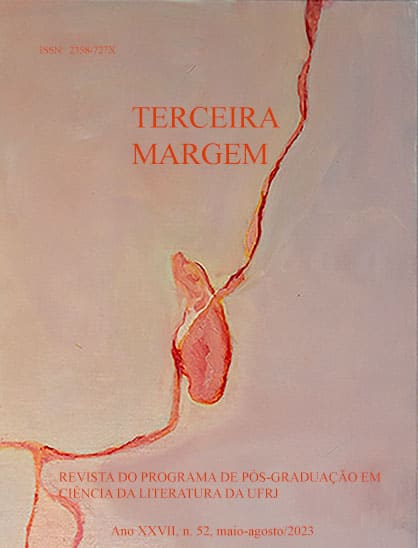1.9 Touching Bodies: Reading Jean-Luc Nancy alongside Husserl
DOI:
https://doi.org/10.55702/3m.v27i53.61176Palavras-chave:
toucher, Nancy, Husserl, Ideas IIResumo
Este artigo demonstra a maneira pela qual o pensamento de Nancy sobre o toucher é herdeiro, mas, ao mesmo tempo, radicalmente se distancia da fenomenologia do corpo de Husserl em Ideas II. Em primeiro lugar, demonstro a maneira como o toque é crucial para a constituição de Leib como: 1) unidade não sujeita à fragmentação, 2) orientação ponto zero, e 3) portador de sensações localizadas. Em seguida, demonstro a maneira pela qual a compreensão de Nancy do toucher subverte as características husserlianas de Leib e assim mina a centralidade da intencionalidade que permanece presente no Husserl tardio. Abstract: In this article I show how Nancy’s thinking on toucher inherits but also radically departs from Husserl’s phenomenology of the body in Ideas II. First, I show how touch is crucial to the constitution of Leib as 1) unity not subject to fragmentation, 2) zero point of orientation, and 3) bearer of localized sensations. Then, I show how Nancy’s understanding of toucher subverts the Husserlian characteristics of the Leib and hence undermines the centrality of intentionality that remains present in the later Husserl. Keywords: toucher; Nancy; Husserl; Ideas IIDownloads
Referências
DERRIDA, Jacques. Le toucher, Jean-Luc Nancy. Paris: Galilée, 2000.
GARRIDO, Juan Manuel. Jean-Luc Nancy’s Concept of Body. Epoche: A Journal for the History of Philosophy, 14(1) (2009).
HUSSERL, Edmund. Cartesian Meditations: An Introduction to Phenomenology. Tr. D. Cairns. The Hague: Martinus Nijhoff, 1982.
HUSSERL, Edmund. HUA IV: Ideen zu einer reinen Phänomenologie und phänomenologischen Philosophie. Zweites Buch: Phänomenologische Untersuchungen zur Konstitution. Ed. M. Bimmel. Dordrecht: Springer, 1991.
HUSSERL, Edmund. Ideas Pertaining to a Pure Phenomenology and to a Phenomenological Philosophy. Second Book: Studies in the Phenomenology of Constitution. Tr. R. Rojcewicz and A. Schuwer. Dordrecht: Kluwer Academic Publishers, 2000.
HUSSERL, Edmund. Ideas Pertaining to a Pure Phenomenology and to a Phenomenological Philosophy. First Book: General Introduction to a Pure Phenomenology. Tr. F. Kersten. The Hague: Kluwer Academic Publishers, 1983.
JAMES, Ian. The Fragmentary Demand: An Introduction to the Philosophy of Jean-Luc Nancy. Stanford: Stanford University Press, 2006.
MORIN, M.-E. and GRATTON, P. (eds.). The Nancy Dictionary. Edinburgh: Edinburgh University Press, 2015.
MORIN, Marie-Eve. Corps propre or corpus corporum: Unity and Dislocation in the Theories of Embodiment of Merleau-Ponty and Jean-Luc Nancy. Chiasmi International 18 (2016).
MORIN, Marie-Eve. Jean-Luc Nancy. Cambridge: Polity Press, 2012.
NAKHUTSRISHVILI, Luka. Corps propre et corps technique(s) : Jean-Luc Nancy et la phénoménologie. Studia Phaenomenologica XII (2012).
NANCY, Jean-Luc. Strange Foreign Bodies. In: Corpus II: Writings on Sexuality. Tr. A. O’Byrne. New York: Fordham University Press, 2013.
NANCY, Jean-Luc. Surprise de l’événement. In: Être singulier pluriel. Paris: Galilée, 2013.
NANCY, Jean-Luc. Corpus. Tr. R. Rand. New York: Fordham University Press, 2008.
NANCY, Jean-Luc. The Extension of the Soul. In: Corpus. Tr. R. Rand. New York: Fordham University Press, 2008.
SUMMA, Michela. Spatio-temporal Interwining: Husserl’s Transcendental Aesthetic. Cham: Springer, 2014.
Downloads
Publicado
Edição
Seção
Licença
Autores que publicam nesta revista concordam com os seguintes termos:
- a. Autores mantém os direitos autorais e concedem à revista o direito de primeira publicação, com o trabalho simultaneamente licenciado sob a Licença Creative Commons Attribution que permite o compartilhamento do trabalho com reconhecimento da autoria e publicação inicial nesta revista.
- b. Autores têm autorização para assumir contratos adicionais separadamente, para distribuição não-exclusiva da versão do trabalho publicada nesta revista (ex.: publicar em repositório institucional ou como capítulo de livro), com reconhecimento de autoria e publicação inicial nesta revista.
- c. Autores têm permissão e são estimulados a publicar e distribuir seu trabalho online (ex.: em repositórios institucionais ou na sua página pessoal) a qualquer ponto antes ou durante o processo editorial, já que isso pode gerar alterações produtivas, bem como aumentar o impacto e a citação do trabalho publicado (Veja O Efeito do Acesso Livre).

